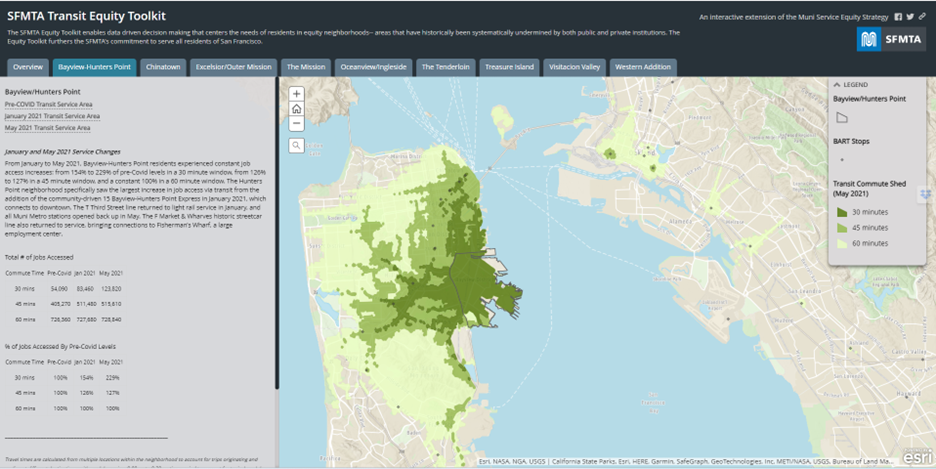- March 3, 2020
- Economic Mobility
“I’m glad you did this. I had to walk home at 11 at night over five miles, and now that this is available I don’t have to walk anymore.” This was the response from a participant in South Bend, Indiana’s Ride Guarantee, a pilot program to test low-cost multi-modal transit for local employees. Working with large local businesses, the local transit authority, and ride-sharing company Lyft, the city government is trying to ease the transportation burden on workers in the city.
Commuters Trust, the public-private partnership that facilitates Ride Guarantee, is supported by the Bloomberg Philanthropies Mayors Challenge. Two years ago, a South Bend study found that unreliable transportation was one of the main barriers to job retention. In 2018, a 12 week pilot experiment to address this issue showed that having a commuter benefit improved worker absenteeism, job retention, and on-time arrivals. Due to the success of this “transportation as a benefit” test, South Bend won funding through the Mayors Challenge in 2018 to expand this work.
The Ride Guarantee program aims to increase the economic mobility of South Bend residents by improving transit mobility. There were a few changes in the second pilot, which started just after Labor Day 2019 and extended to the end of February 2020. In this iteration, both employers and employees are contributing to help defray the cost of transportation, whereas the 2018 pilot was grant-funded. Additionally, there is a new text-to-enroll process to ease enrollment and communication with the Ride Guarantee team.

According to Director Aaron Steiner, Ride Guarantee functions similarly to other employee benefits, like health care. Both the employer and the employee cover nominal costs to participate in the program. With Lyft as the city’s ride-share partner, employees can take up to 20 rides a month. The first two rides are 1 cent each, while the next 18 rides are a flat rate of $4. All the rides must start or end at the participant’s workplace, a stipulation that is enforced through geo-fencing. Ride Guarantee also provides a free local bus pass, so that participants can take unlimited Transpo rides in and around South Bend; this is new for the 2019 pilot. One participant, in their response to the fall 2019 survey of users, said that due to the reduced Lyft prices “my anxiety has gotten a lot better, because I feel like I can spend more on other essentials like groceries.” Clearly, this program is having an impact on quality of life and economic choices for local employees.
The City of South Bend is one of the three major employers that participates in this program. All of the employers want to support their shift and part-time workers, who are often unable to add shifts or adjust their schedules due to transportation challenges. Without reliable transit, the workers struggle to add hours, which can in turn make it harder for them to earn more and improve their economic situation. The Ride Guarantee program provides low-cost flexibility, so that workers aren’t dependent on a single mode and can choose how to add ride-sharing and bus transit into their mobility mix. The city’s fall 2019 mid-point survey analysis of Ride Guarantee found that 75 percent of users were able to work extra shifts because of the program.
Steiner also had to build flexibility into the program delivery. For instance, many of the employees either don’t have smartphones, or have limited network coverage and data. For those individuals, South Bend has allowed a few creative adjustments. Participants without smartphones can sign up and create a Lyft account online, then request rides through the online portal without needing to use the smartphone app. And for participants who are unbanked, reloadable, prepaid cards can be used to pay for the rides.
One participant without a smartphone downloaded the app on her daughter’s device, and calls her when she needs a ride. The daughter can then order the car for her mom, within the geo-fenced limits. Steiner is also considering other ways that the city could help with ride access, including a dispatch service. Instead of relying on family and friends, participants without smartphones could call into the staffed center and order a ride that way. Or, Steiner said the program may look at ways to help participants acquire and pay for smartphones.

Data collection for this program relies on focus groups and surveys of the employees, who will complete both pre-project and follow-up surveys. Employers are asked about differences in absenteeism, worker’s ability to pick up extra shifts, employee turnover, late arrivals, and employee satisfaction. However, the businesses aren’t sharing detailed information that could be identifiable as individual employees. The required data is returned to Steiner’s team in an aggregate, de-identified way.
Steiner’s team collects data from Lyft on program usage, including timing and aggregated information on origin and destination, to help assess how and when Lyft is being used. Less data is collected from the Transpo buses, as the public transit infrastructure has less capacity to track boardings and usage. However, the city doesn’t expect too much bus commuting, since the route coverage isn’t extensive and the scheduling isn’t conducive for late night and early morning shifts. In fact, many of the participants in the fall survey reported that they would recommend the program to coworkers who are currently taking the bus.
In the first four months of the pilot, participants took over 1,500 discounted Lyft rides and over 1,700 free bus rides. Working with employer partners, the team tracked 155 employees who participated and saw a 29% decrease in absences, compared to the same four-month time period a year prior. For many of the respondents, there was a peace of mind that came with the program, especially considering the difficult winter conditions and fear that car troubles would impact their standing at work. “Knowing I can afford a ride home makes me feel secure,” said one participant in the survey.
While the Ride Guarantee initial pilot is scheduled to end on February 29th, 2020, South Bend is scheduled to continue this program throughout 2020, expanding to include several new employer partners and adding new modes including a carpool program.





